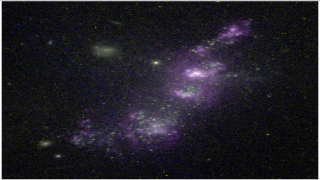Bibcode
Rose, M.; Tadhunter, C. N.; Holt, J.; Rodríguez-Zaurín, J.
Referencia bibliográfica
Monthly Notices of the Royal Astronomical Society, Volume 432, Issue 3, p.2150-2176
Fecha de publicación:
7
2013
Número de citas
18
Número de citas referidas
18
Descripción
We present optical spectra for a representative sample of 27 nearby (z
< 0.2) Two Micron All Sky Survey (2MASS)-selected active galactic
nuclei (AGN) with red near-infrared colours (J - KS ≳
2.0). The spectra were taken with the ISIS spectrograph on the William
Herschel Telescope with the aim of determining the nature of the red
2MASS AGN, in particular whether they are young quasars obscured by
their natal cocoons of gas and dust. We compare our findings with those
obtained for comparison samples of PG quasars and unobscured type 1 AGN.
The spectra show a remarkable variety, including moderately reddened
type 1 objects (45 per cent), type 1 objects that appear similar to
traditional ultraviolet (UV)-/optical-selected AGN (11 per cent),
narrow-line type 1 Seyfert AGN (15 per cent), type 2 AGN (22 per cent)
and H II/composite objects (7 per cent). The high Balmer decrements that
we measure in many of the type 1 objects are consistent with their red J
- KS colours being due to moderate levels of dust extinction
(0.2 < E(B - V) < 1.2). However, we measure only modest velocity
shifts and widths for the broader [O III]λ5007 emission-line
components that are similar to those measured in the comparison samples.
This suggests that the outflows in the red 2MASS objects are not unusual
compared with those of optical-/UV-selected AGN of similar luminosity.
In addition, the Eddington ratios for the 2MASS sample are relatively
modest. Overall, based on their optical spectra, we find no clear
evidence that the population of red, 2MASS-selected AGN at low redshifts
represents young quasars. Most plausibly, these objects are normal type
1 AGN that are moderately obscured by material in the outer layers of
the circumnuclear tori or in the discs of the host galaxies.
Proyectos relacionados

Grupo de Estudios de Formación Estelar GEFE
El proyecto interno GEFE está enmarcado en el proyecto coordinado, ESTALLIDOS, financiado por el plan nacional desde el año 2001. El ultimo proyecto aprobado es ESTALLIDOS 6.0 (AYA2016- 79724-C4-2-P). En el proyecto GEFE trabajamos en base al caso científico del proyecto ESTALLIDOS 6.0. Los estallidos de formación estelar (Starbursts o SB) son
Casiana
Muñoz Tuñón